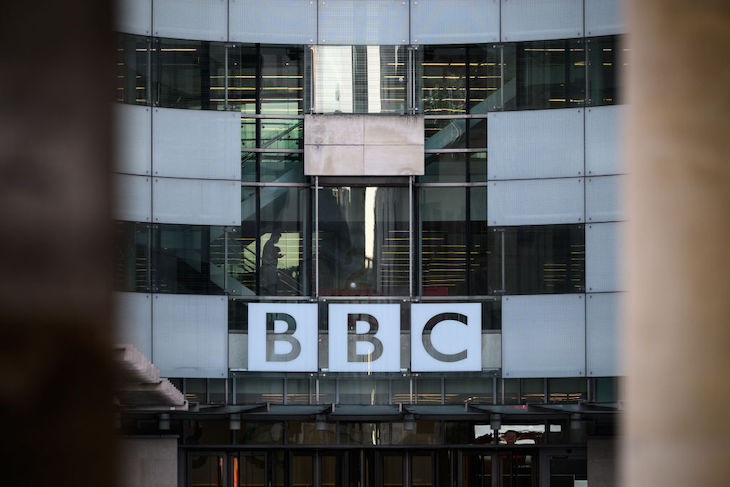When Alex Salmond was leader of the SNP he used to complain bitterly to the broadcasters that it was unfair to stage TV debates with three unionist party leaders – Labour, Conservatives and the Lib Dems – against the one nationalist. In last night’s Scottish leaders debate though, the unionist imbalance hardly figured. That is because independence hardly figured.
Anas Sarwar arguably won by sheer persistence, though his robotic delivery might have alienated some voters.
The Tory leader, Douglas Ross got in his customary line about the SNP’s ‘obsession’ with separatism and the SNP leader, John Swinney, agreed that independence remained ‘line one, page one’ of the SNP manifesto, but that was about it.
If this was a rather tame and uneventful leader’s debate it was largely because of the relative absence of the issue that has dominated Scottish politics for two decades. For once it actually was about who runs Westminster.
The soundbite of the night was John Swinney saying Labour was going to ‘walk it’ on 4 July. This must be the first time that an SNP leader has ever conceded defeat before a vote has been cast. His point of course was that, since Labour had ‘signed up to Tory austerity’, Scots needed SNP MPs to ensure ‘Scotland had a voice in Westminster’.
The Scottish Labour leader, Anas Sarwar, rebutted this with the much-rehearsed line that Scotland ‘cannot afford to miss this opportunity’ to get rid of this ‘rotten, corrupt, lying, cheating Tory government’. Say what you mean, Anas, why don’t you.
But he looked just a little uncomfortable when Swinney quoted the Institute for Fiscal Studies assessment that Labour faces an £18 billion budgetary black hole which will have to be filled by tax rises or public spending cuts. Sarwar disputed this vehemently. He insisted that cash raised from closing ‘non dom tax loopholes’ and from the ‘windfall tax on the obscene profits of the oil and gas companies’ will balance Labour’s books. I don’t think anyone was convinced.
Both Swinney and the Conservative leader Douglas Ross rounded on Labour’s plans to increase and extend the energy windfall tax. Ross claimed this would cost tens of thousands of jobs. Sarwar promised that there would be no ‘cliff edge’ for North Sea oil and gas ‘no turning off the taps’ and that Labour would work with the industry to secure ‘energy security’. He did not repeat his leader, Keir Starmer’s, promise to ban all future drilling licences.
It made a change to hear the oil and gas industry almost celebrated by politicians who’ve been highly critical of it in recent times. John Swinney sounded positively bullish on the future of the fossil fuel industry. But didn’t the SNP also want a ban on exploration? Apparently not.
Questioned repeatedly by Douglas Ross, and by the moderator Colin Mackay, Swinney refused to echo his party’s ‘presumption against drilling’, saying only that he would insist that any new development should pass a ‘climate compatibility test’ whatever that is.
The politician who had the most difficult night was undoubtedly the Scottish Conservative leader, Douglas Ross. He sounded almost penitent when confronted with the mistakes of recent Tory prime ministers. He refused to condone Boris Johnson’s parties during Covid; said he was mistaken about Liz Truss’s mini budget, which he’d wrongly thought had been properly costed beforehand; and he declined the offer to back the former Home Secretary Suella Braverman’s handling of street demonstrations. ‘I hold my hands up’ said Ross, disarmingly. But the other party leaders were taking no prisoners. Anas Sarwar said Ross should be ‘begging for people’s forgiveness’ not ‘pleading for their votes’.
Mr Ross did however manage to deliver a swipe against Nigel Farage. A vote for Reform he said would be a vote for the SNP.
I doubt if any voters’ minds will have been changed by this somewhat somnolent debate. Lacking an audience and atmosphere, it sounded too much like the routine exchanges at First Minister’s Question Time. There were no obvious mistakes and no real revelations – except perhaps the change in tone about oil and gas. Anas Sarwar arguably won by sheer persistence, though his robotic delivery might have alienated some voters.
John Swinney avoided any obvious gaffes and was put under very little pressure considering the controversies of recent weeks. He wasn’t challenged seriously over his defence of the disgraced former minister, Michael Matheson, or over his recent confusion over the Gender Recognition Reform Bill. Nor was Keir Starmer’s remarks on nuclear weapons raised. Yet both the SNP and the Scottish Labour party have passed conference motions in recent years calling for unilateral nuclear disarmament.
The token Liberal Democrat, Alex Cole-Hamilton, got in his message about the sewage problem and about ‘fixing our relations with Europe’. And that was about it. Momentous it was not. You couldn’t help feeling that the action, politically speaking, was elsewhere.








Comments